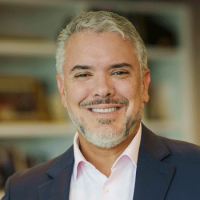A Conversation with Iván Duque Márquez, President of the Republic of Colombia
Facing one of the most challenging moments in Colombia’s history, Colombian President Iván Duque engaged in a wide-ranging conversation in an event co-hosted by the Wilson Center and the Inter-American Dialogue. In recent weeks, Colombia has witnessed massive street protests along with acts of vandalism, looting, police violence, and road blockages. The COVID-19 pandemic has devastated the Colombian economy, leading to increases in unrest, poverty, and unemployment.
President Duque discussed factors that are driving the current turmoil and the government's efforts to calm tensions, including through a national dialogue.
Event Snapshots
- The Colombian government will always guarantee the right of the Colombian people to assemble peacefully, but it will also maintain a zero-tolerance policy for any violation of human rights and unlawful conduct.
- The Duque administration has launched programs to provide tuition-free college to students from low and middle-income households, give young Colombians a voice in the policymaking process, and create opportunities for the youth to become a generation of homeowners.
- Nearshoring in the Americas will generate employment, trigger economic growth, and reduce the number of migrants arriving at the U.S. southern border. Two million jobs can be generated in five years if Colombia produces just one percent of what is going to potentially be near-shored in the Americas.
Selected Quotes
AMBASSADOR MARK GREEN
“Our greatest concern to us all has been the loss of life, in some cases involving the excessive use of force by the police. Thousands of demonstrators and police themselves have been wounded. The Duque government is partnering with the Attorney General to swiftly investigate these tragic episodes and to bring accountability.”
IVÁN DUQUE MÁRQUEZ
“What we are seeing today is a situation where there are multiple faces—we see the face of those who are genuinely and peacefully protesting in the streets because yes, they have been affected by the pandemic and that is the case with the youngsters and women. But, we have also seen the face of extreme violence, vandalism, the destruction of public infrastructure, and also in some places, the influence of armed groups who are promoting that kind of conduct to create uncertainty. And yes, those circumstances have to be addressed with law and order. […] Since day one of my administration, I have said we are a supporter of all the forces of law and order, but we have said since day one that there is a zero-tolerance policy if a member of the military or the police goes beyond the law. And we have acted that way. And especially, we have to recognize that the Colombian police performs on an annual basis more than 30 million police procedures. And yes, are there cases of abuse? Yes, there are, as there are in any city of the United States, but they are investigated, and they are sanctioned and they are sanctioned promptly. And we work with the Attorney General’s office, with the Procurator General, and the Ombudsperson’s office so that those investigations take place, because the zero-tolerance policy was presented since day one of my administration. […] We know the young people in Colombia have necessities and we have to address it but we also have to be clear that those cases of vandalism have to be faced with law and order."
“On the youngsters, for example, we have already launched what is the most ambitious program ever on public education in terms of university. We are providing free public university, technical and technological university, for kids that are from the poorest of the poor families and are of the middle class. And that is an unprecedented program that began last year and we are now going to extend as a state policy. But, we also understood listening to the claims that they have expressed in different scenarios that they want to have jobs. So that is why we have already launched a program that will begin on July 1st , which is, if you hire a young person between 18 and 28, we will subsidize the equivalent of the social security so that they can be hired by the private sector or any other contractor. And that is something that is going to generate a positive impact. I should also mention that in that pact on the youth, for the first time in a Latin American country, we are going to have free and open elections of the youth district councils and that will happen in November. So, that will have the local, the regional, and the national youth councils so that they can participate and involve themselves in policymaking. And, obviously we have to do something bigger in terms of opportunity, and we launched a housing program because people between 18 and 28 are 18 percent of the Colombian population but they represent 41 percent of the people that have bought low income housing. 50 percent of that 41 percent have received subsidies in our government. And we believe if we want to have a society of owners, we have to do something more aggressive. And we launched a program so that we will have the lowest interest rates ever in the housing market […] so that we also open the opportunities for that generation to become a generation of owners.”
“So if the U.S. now identifies what are the major challenges that are derived from Latin America, the U.S. has to deal on a permanent basis with a migration pressure in [its] southern border. […] Now, can that be changed strategically? In my opinion, in my humble opinion, yes. How can that be changed? With a nearshoring policy. Why? Because, instead of having so much concentrated industrial production in Asia and other parts of the world, being in the Americas, being close to market, having a competitive labor market, [and] improving the cost of energy, can also be an opportunity to found an industrial base in Latin America, generate employment, reduce the pressure on the southern border, and be able to build lasting development impacts in the countries. If you ask me in the case of Colombia, Colombia has a free trade agreement with the United States, if we just get one percent of what is going to be potentially near-shored in the Americas that simply can almost open the opportunity to almost two million jobs within a five-year framework and that is transformational. Where can those investments be located? In the northern coast of Colombia. Not only close to market, [but] very competitive, energy prices coming down, having a transition on energy that is going to allow solar and wind to be part of that competitiveness, having the ports being located there, and be able to connect through the Panama Canal to the west and the east coast of the United States. So, I think nearshoring, very well planned can substantially be […] the next stage of an alliance with Latin America that will generate employment, will trigger growth, will reduce the pressure of the southern border, and definitely allow more U.S. companies to build what we call ‘aggregated value chains’ around the world. I think that if there is a big commitment, bipartisan [and] bicameral, on this effort, this is going to be transformational in our region.”
Speaker

President of the Republic of Colombia (2018-2022)
Moderators


Hosted By

Latin America Program
The Wilson Center’s prestigious Latin America Program provides non-partisan expertise to a broad community of decision makers in the United States and Latin America on critical policy issues facing the Hemisphere. The Program provides insightful and actionable research for policymakers, private sector leaders, journalists, and public intellectuals in the United States and Latin America. To bridge the gap between scholarship and policy action, it fosters new inquiry, sponsors high-level public and private meetings among multiple stakeholders, and explores policy options to improve outcomes for citizens throughout the Americas. Drawing on the Wilson Center’s strength as the nation’s key non-partisan policy forum, the Program serves as a trusted source of analysis and a vital point of contact between the worlds of scholarship and action. Read more

